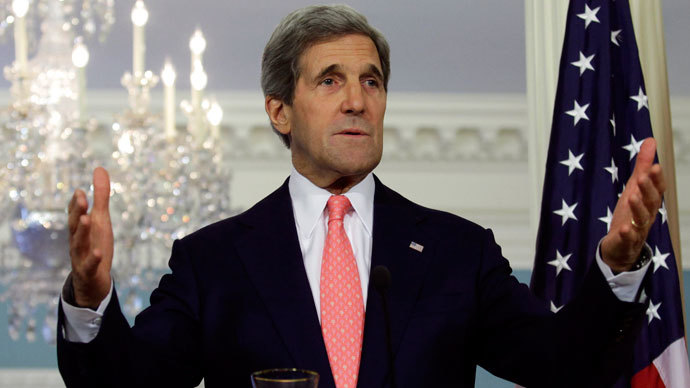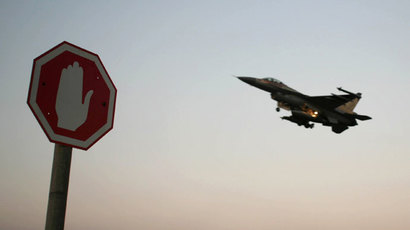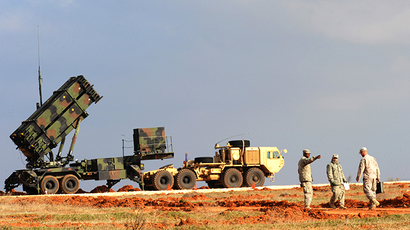Kerry condemns Assad for threatening peace talks as CIA ‘prepares’ to arm rebels

The use of chemical weapons by Damascus and Hezbollah involvement in Syria risks derailing a political settlement to the conflict, John Kerry warned. His comments follow reports the CIA is preparing to funnel arms to rebel forces via Jordan and Turkey.
The US State Department issued a statement on Saturday condemning the government of Syrian President Bashar Assad for its lack of commitment to a negotiated settlement after Secretary of State John Kerry spoke with his Iraqi counterpart the previous day.
"The secretary reaffirmed that the United States continues to work aggressively for a political solution with the goal of a second Geneva meeting, but that the use of chemical weapons and increasing involvement of Hezbollah demonstrates the regime's lack of commitment to negotiations and threatens to put a political settlement out of reach," the department said.
The statement further noted it’s appreciation for Iraqi Foreign Minister Hoshyar Zebari, who issued a June 11 statement “discouraging Iraqis from joining the fight in Syria.”
Kerry, who expressed concern over the “increasingly sectarian nature of the Syrian conflict on both sides,” asked Zebari to take “every possible measure to help end the military resupply of the Assad regime and thereby increase the pressure that will be necessary to advance a political solution."
On Thursday, the Obama Administration said it would reverse US
policy of not providing lethal aid to rebel fighters after
claiming the Syrian government had crossed a red line by
allegedly deploying chemical weapons against opposition forces on
four separate occasions.

Russian presidential aide Yury Ushakov characterized the evidence provided by the United States regarding the use of chemical weapons by Damascus as “unconvincing.”
Russian Foreign Minister Sergey Lavrov also warned the US against sending rebel factions in Syria the “wrong signals” with promises of increased military aid, a move which would shift their focus on "escalating the fight instead of starting a dialogue.”
However, the US said the arms shipments would begin within a matter of weeks, with the CIA acting as the middleman between Washington and the opposition’s Supreme Military Council.
CIA to arm rebels via Jordan, Turkey?
On Saturday, the Washington Post reported that clandestine bases in Jordan and Turkey would serve as conduits for arms being delivered to the rebel fighters amidst fears American armaments would fall into the hands of Syria’s many Islamist factions.
Despite concerns expressed by US intelligence officials last
year, Benjamin Rhodes, Obama’s deputy national security adviser,
said on Friday the US is capable of delivering arms “not only
into the country,” Rhodes said, but “into the right
hands.”
“The Syrian puzzle has come into sharper focus in the past
year, especially the makeup of various anti-regime groups,”
one US official familiar with CIA assessments of the conflict
told the Post on condition of anonymity. “And while the
opposition remains far from monolithic, its military structures
and coordination processes have improved.”
Such reassurances have had little impact on the Obama
administrations reticence towards providing antitank or
antiaircraft weapons to rebel groups, as the initial deliveries
will include light arms and other munitions.

US military leaders have previously stated that tracking heavy
weaponry delivered to rebel groups such as MANPADs — man-portable
air-defense systems – remained unreliable.
Obama’s decision to approve CIA weapons shipments could also
signal green light to regional allies like Qatar and Saudi Arabia
to provide such heavy weaponry despite concerns such armaments
could be used against civilian aviation targets by terrorist
groups.
US diplomats have also intonated that Washington might impose a
no-fly zone “to help Assad's opponents.”
No-fly zone looming?
The Pentagon on Saturday confirmed suspicions that F-16 fighter
jets and Patriot anti-missile systems which were deployed to
Jordan as part of the joint 12-day Eager Lion exercise would
remain in the country once the annual training event
concluded.
US Defense Secretary Chuck Hagel "has approved a request from
the Kingdom of Jordan for a detachment of F-16s and Patriot
Missiles to remain in Jordan following the conclusion of the
Eager Lion Exercise next week," Reuters cites Pentagon
spokesman George Little as saying in a statement.
"All other US personnel assigned to Jordan for Eager Lion will
depart at the conclusion of the exercise,” the statement
continued.

Lavrov said that any attempt to enforce a no-fly zone over Syria
using the F-16s and missile batteries would be in clear violation
of international law.
"There have been leaks from Western media regarding the serious
consideration to create a no-fly zone over Syria through the
deployment of Patriot anti-aircraft missiles and F-16 jets in
Jordan," Lavrov said.
"You don't have to be a great expert to understand that this
will violate international law," Russia’s top diplomat
continued.
Washington’s willingness for more direct engagement in the Syrian
conflict comes ahead of the
Geneva II peace conference set for July.














